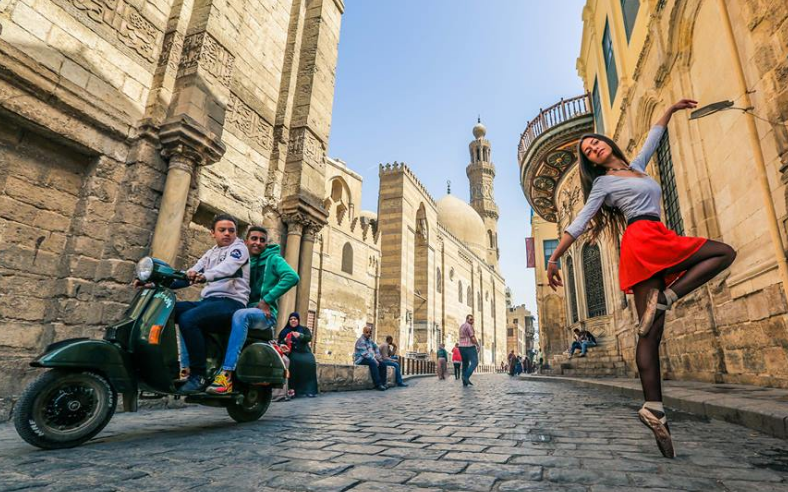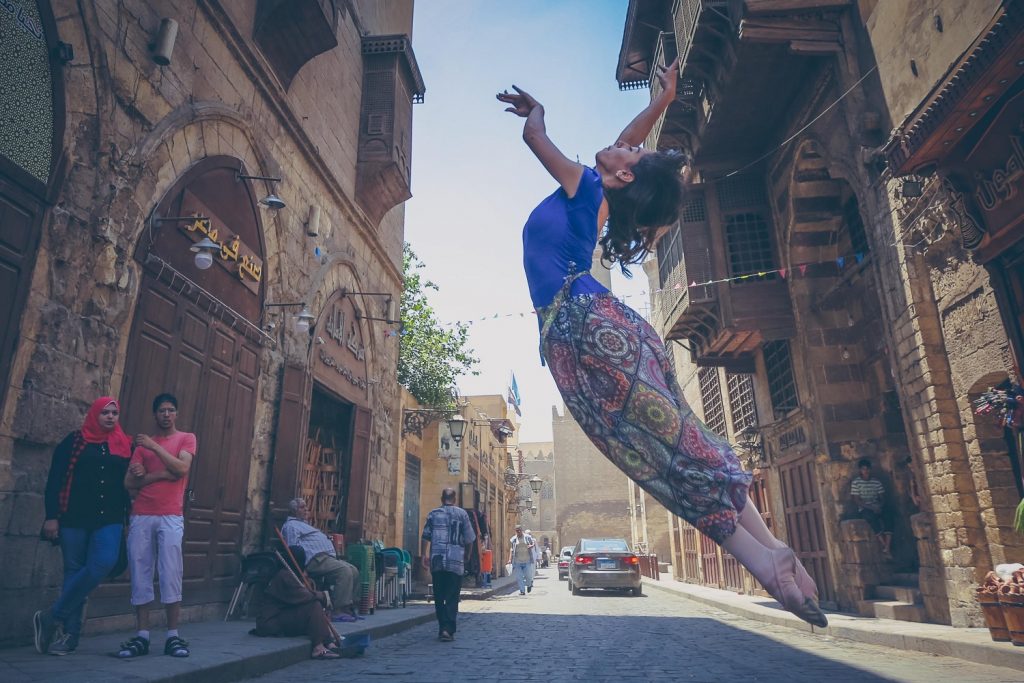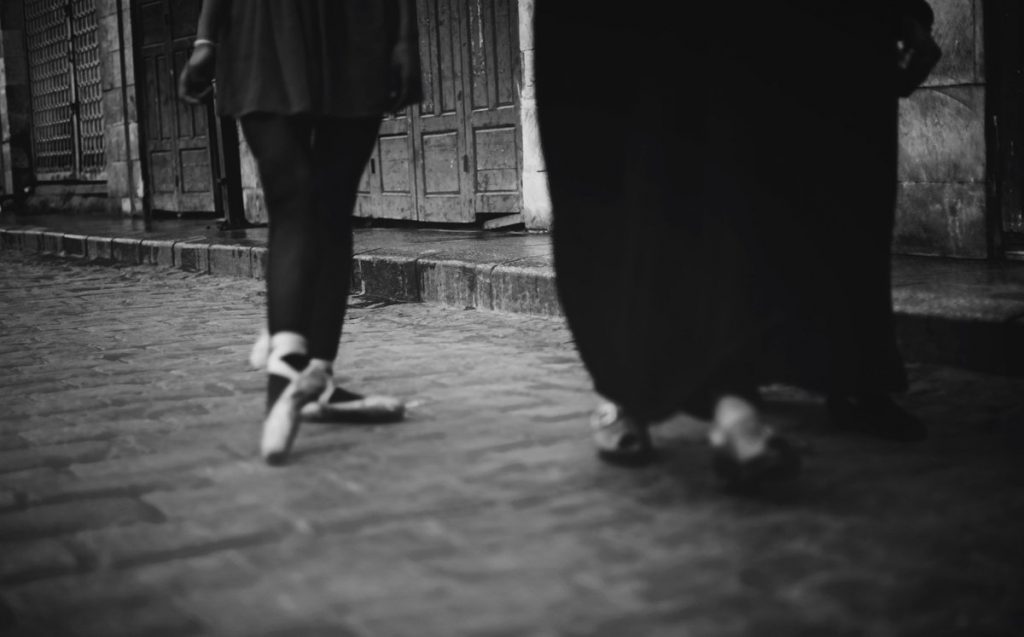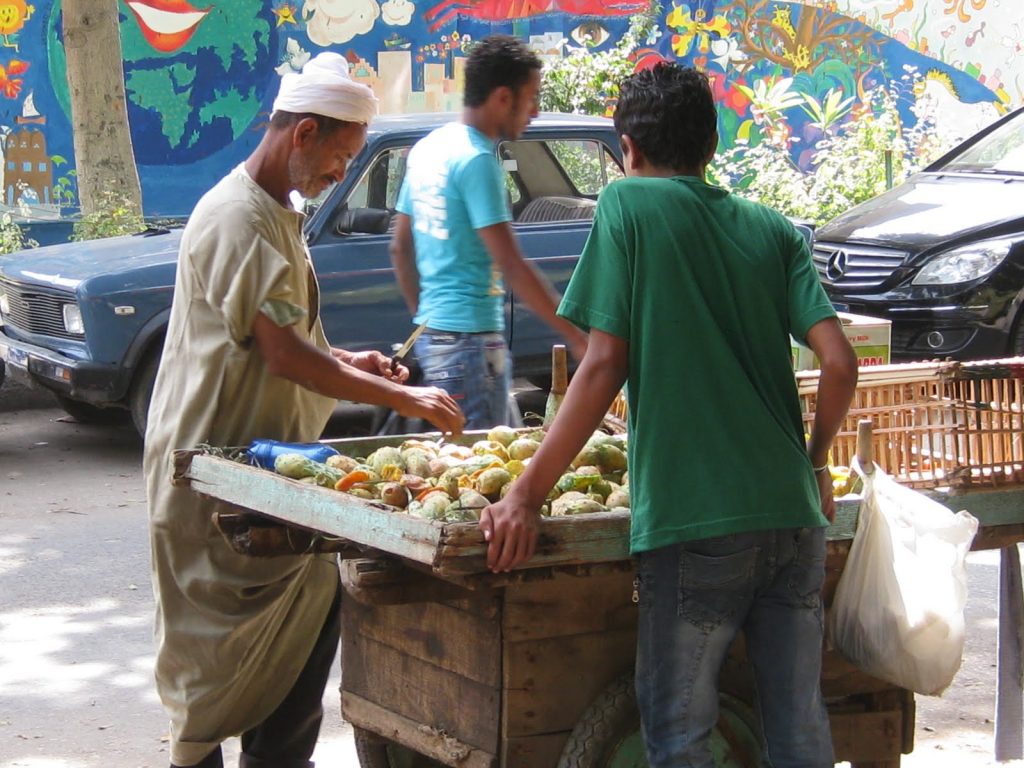Mohamed Taher/Ahmed Fathy
By
Ahmed Tharwat
The young ballerina Nour Yasser went on a dancing spree across Cairo’s old streets. “She captivates city dwellers and passers-by, drawn to a scene unusual in Egypt’s conservative urban life,” reported the Cairo Scene. “Our project aim was to explore the beauty and diversity of Cairo,” photographers Mohamed Taher and Ahmed Fathy explained.
Egyptians have been dancing in the street for ages, at wedding, sports events, at religious social festivals, and in any occasions. The difference was, there wasn’t the intrusion of a camera.
Photo – Mohamed Taher and Ahmed Fathy
As you look at the photo of the ballerina cutting through the streets, flashing her western dress superimposed on the heart of the old city, the few locals looked at this cultural oddity and cringed, bewildered. However, at the same time they welcomed those dancers in their midst. The same locals may get arrested if caught walking, let alone dancing, in the street where those dancers live. The Cairo streets didn’t really need a ballerina from outside to remind the locals of how beautiful their streets are, Egyptian streets have always been vibrant, full of lives and history.
What was missing from all this Ballet in Cairo project, is the people who live there, their lives, and their stories. Streets are the most honest place left in Egypt right now. Egyptians may feel that they lost their political freedom and country squares, but they still feel they own the streets. One of the most culturally enriching experiences I had when I lived in Egypt, was spending time walking the streets, where you can observe a snapshot of five thousand years of history and culture in one block. I have always enjoyed walking aimlessly losing myself in Cairo’s streets listening to its stories. As they say, if you don’t know where you are going, you never get lost.
Photo -Mohmed Taher and Ahmed Fathy
On my last visit to Egypt, on a chilly summer evening in the city of Cairo, after a long day visiting and jostling with shopkeepers and friends, I walked into the city that never sleeps. The streets were nervously quiet, lost in the dark alleys of downtown, no particular place to go, nobody to speak with, hugged by the tired old building and broken sidewalks. The lights were tired and blurred, trash freely flying in the air, performing the last dance of the night, with no one to admire or cheer its elegant dance. The square finally rested after a long day of traffic abuse, stores finally retired, their doors closed with big locks, cats and dogs running across with some purpose.
I walked aimlessly through Cairo’s streets as therapy, as it cleanses your soul. I was alone, having the city all to myself, trying to lose the sorrows of the day. I crossed Liberty Square, which was empty and quiet. That Square, the focal of world attention for 18 days, the Square where millions of Egyptians chanted Life, Freedom and social justice, was quiet, and abandoned. I reached the Nile river that breaks into the heart of the city. The fresh air, the reflection of the stars on the river surface, telling many stories of broken hearts, causalties of love stories left behind on the river bank –Al-Qurneesh.
The sky was clear with just of scattering of small stars, and no moon to focus on. A short distance away I spotted a street cart tucked away next to a damaged sidewalk, with a pile of Prickly Pear Cactus on the top of the cart, fresh, colorful, and inviting, its piercing sharp pricks seeming ready to deter any intruder. The sleepy owner was not in a selling mood, lying down next to the cart, his dog unmoved and oblivious; not sure what to do, whether to wake the man or leave him alone with his dreams. On the streets of Cairo, it is hard to tell if business is open or closed.
Photo – Maryanne Stroud Gabbani
I slowly approached the cart, stood quietly looking at the Prickly Pears, and without uttering a word, or asking anything of him, the man woke up and started, peeling the fresh cactus with his bare hands, one by one scoming out of its shell, like a naked new born. He quietly handed them to me one at time, miraculously avoiding its sharp pricks, Then the conversation with a stranger broke out, like Shahrazad, as long as his stories go, eating the fresh Cactus never stopping. He never asked me my name, where I’m from, nor what I was doing late at night alone. The man wasn’t as much interested in my story as much I was interested in his.
Eventually I realized that I was full and this had to end. I tried in vain telling him “Kefayah” (enough), then there is always one last story to tell and one last cactus fruit to peel. I wanted to keep the evening alive, I wanted to hear another story, but my stomach couldn’t bear anymore cactus! How much do I owe you?, which is not so common in street market transactions, usually a social pricing. You pay based on your own personal experience and social economics status. “Nothing, it is on me Sir,” the man said as he started counting all the peeled cactus skins left aside on the cart.
I paid him before he was finished with his counting scheme, then he went back to sleep looking for another dream. I walked away leaving the Cactus fruit man alone, back to my quest for another street story, without dancing over people’s dreams.






No Comments Yet!
You can be first to comment this post!